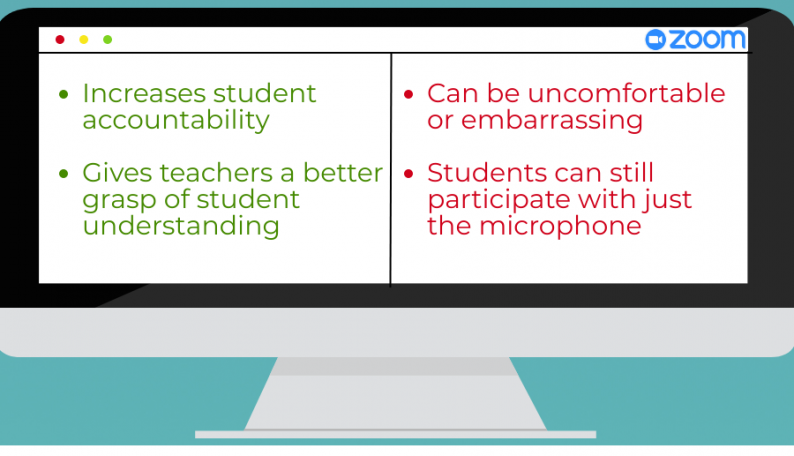As distance learning continues during first marking period, students debate the merits of having zoom cameras on during live classes.
Pro/Con: Are Zoom Cameras Necessary for Student Participation?
October 27, 2020
PRO
During the first weeks of online school, many RHS teachers requested that all students keep their Zoom cameras on during class, prompting concerns over student privacy.
In order to ensure student presence and to improve student engagement and understanding, MCPS should permit teachers to require that students activate their cameras during meetings.
In most online classes, teachers take attendance while students are entering the meeting. For the remainder of time, they instruct their lesson and occasionally ask the class questions, often being met with long periods of silence.
In this virtual setting, where students have the ability to keep their cameras off, they are marked present solely for joining the meeting. There is no guarantee that students are actively paying attention in class or even in front of their computer, unless they enable their cameras or participate during class discussions—which very few do.
Additionally, during classes, teachers need to be able to monitor student engagement and understanding. By utilizing websites like Nearpod or Padlet, many teachers have found alternative ways to gauge student progress without requiring cameras. These sites allow teachers to ask questions, which students answer through typed responses. However, participants often experience issues accessing the material, making these websites inadequate replacements for teachers to see students’ advancement.
Considering the lack of student engagement during class discussions, enabling cameras would be an important backup for teachers to see if students understand lessons when apps like Nearpod fail, as they can view their facial expressions.
Finally, online classes are as new and uncomfortable for teachers as they are for students. Teachers are accustomed to the traditional classroom and seeing students in person, walking around the classroom and being able to talk to students one-on-one. This adjustment has not been easy for anyone, and is especially difficult for teachers to teach while staring at a sea of black boxes.
“As a teacher, I’m much better able to read a room, notice body language, observe expressions and interactions when I can see students face-to-face. I miss being able to do that in the virtual setting, especially when students don’t turn on their cameras,” biology teacher Fariha Khan said.
Student privacy is a valid concern, but MCPS addressed the issue of student privacy before online classes began. Students who are adamant about keeping their cameras off can opt-out of being recorded through having their parents sign a waiver form on ParentVue.
Additionally, to address students’ technological needs, MCPS is providing chromebooks—which are equipped with cameras—to all MCPS students. Therefore, if a teacher asks for the entire class to turn on their cameras, all students are capable of obtaining the technology that will allow them to comply.
Teachers know how to best teach their classes and should be able to dictate how they operate, both in-person and from a distance. Some students may not like having their cameras on durings Zooms, but if their teacher feels it is essential to effectively learning online, they need to opt-out or acquiesce.
CON
As the 2020-2021 online school year commences, students across MCPS click their zoom links to enter class with the option to activate their cameras. However, many teachers in RHS and throughout the county are pushing students to turn their cameras on, even though it is not a necessity.
Not only is pressuring students to show themselves on Zoom an invasion of privacy, it is unnecessary–according to Student Member of the Board Nick Asante as well as MCPS policy–and it can be embarrassing to students.
Not all students have the privilege of being in a quiet environment when attending online school; many have siblings they need to take care of, some may not have their own rooms and some may simply feel uncomfortable allowing their classmates to peer into their personal lives and homes—which can be rather nerve-racking for many, as not everyone lives in an ideal household.
In addition, it is not socioeconomically conscious for teachers to ask students to turn their cameras on. Despite MCPS providing students with chromebooks, which come with cameras, many are using their own device which may not have one; making it impossible for some to show themselves on Zoom.
Teachers should not assume that students are always going to be camera ready. Many students are accessing Zoom meetings while in the comfort of their beds, eating or when dressed informally. Asking students to turn on their cameras at random times can catch many off guard, which can be awkward for both students and teachers.
Rather than pushing students to turn their cameras on during class, teachers should allow students to make the choice themselves. Not only can it be inappropriate timing for students to use their cameras, but there are different circumstances that may prevent or embarrass students from doing so. Having cameras on during class is unnecessary, as the teacher is the one giving instructions and students can participate through their microphones.
